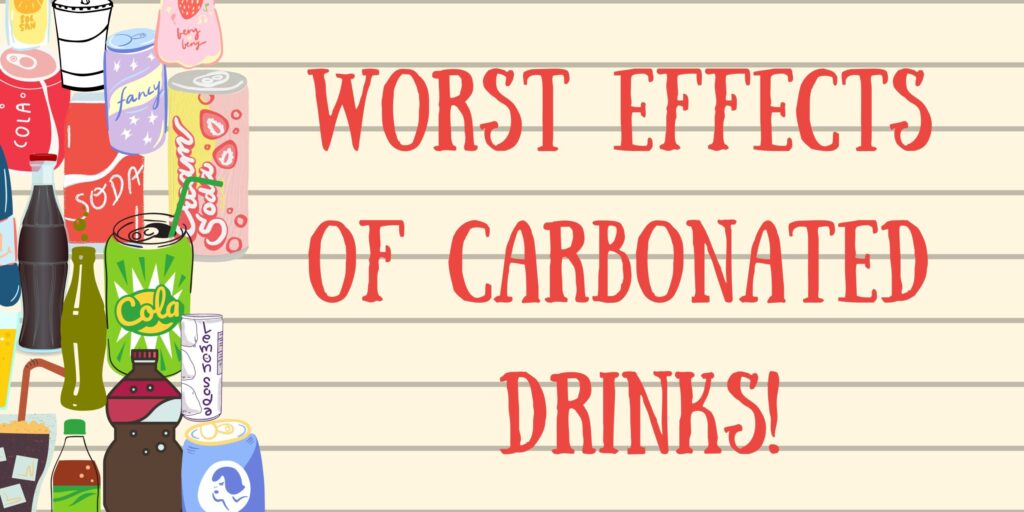Effects of carbonated drinks
The effects of carbonated drinks on the body are elucidated thoroughly in this article. Fizzy drinks, sports drinks, soft drinks, juices, carbonated water, and coffee are among the most popular carbonated beverages drunk worldwide. Carbon dioxide gas is injected into drinks at high pressure, causing the liquid to fizz. The most significant criterion for determining the grade of a carbonated beverage is bubble size, which is also accountable for improving sensory qualities such as appearances and taste. A soft drink is a beverage made out of the water (typically carbonated), a sweetener, and a native or synthetic flavour. A sugar, high-fructose corn syrup, fruit juice, a sugar replacement (in the case of a diet drink), or a mix of these can be used as a sweetener. Caffeine, preservatives, colourings, and other additives may be included in soft drinks. Compared to “hard” alcoholic beverages, soft drinks are referred to as “soft.” Low concentrations of alcohol could be found in soft drinks; however, in many nations and locales, the alcohol concentration must be less than 0.5 percent of the entire volume of the beverage to be deemed non-alcoholic. Lemon-lime beverages, root beer, grape soda, cola, and orange soda are examples of soft drinks.
Carbonated drinks’ adverse effects
The effects of carbonated drinks on the body have the potential to interrupt sleep. Caffeine is highly addictive in soft drinks and serves as a stimulant by increasing adrenaline production. That’s great news whether you need a boost to get through a job deadline or a massive home improvement project. However, if it becomes a regular occurrence, things quickly deteriorate. Caffeine, when ingested in excess, can disrupt your slumber and digestion. They include the risk of diabetes and metabolic syndrome worsening. The high sugar content of most drinks causes a rapid rise in blood glucose levels, which does not help you feel full for long. As a result, your body experiences hunger and exhaustion, setting off a vicious cycle that has a detrimental influence on your waistline and increases the likelihood of type 2 diabetes. Diet soda use can be harmful to your teeth and your overall health. One of the issues is calcium interactions, and soft drink acidity, on the other hand, has been associated with poor tooth health. Acidity may aggravate tooth decay by weakening the enamel, and throughout time, this could lead to additional cavities, fillings, and sometimes even missing teeth.
The aftermath of carbonated drinks
Soft drink use can harm your kidneys, an essential element of your body ‘s internal cleaning mechanism. This implies that when you ingest anything hazardous, your kidneys are in charge of cleaning it out. Acidic beverages, such as Diet Coke, could injure your kidneys and even cause kidney stones if consumed in high quantities. Kidney stones are caused by an imbalance in the minerals and acids in your urine. The effects of carbonated drinks on the body include increasing the likelihood of childhood obesity. Children are at a higher risk since they like drinking these sweet beverages mostly in place of healthful foods. According to one study, reducing soft drink consumption in children and adolescents can considerably decrease obesity. These beverages have no purpose in a child’s diet because many are devoid of nutritious value. Type-2 diabetes, metabolic syndrome, and obesity are all indicators of heart illness, and they’re all made more probable by sugary beverage use. Those who take soft drinks regularly have a 20% increased chance of having a heart attack. There are lower odds of consuming nutrient- and fibre-rich vegetables and fruits if you take sugar excessively from harmful source materials.
Detrimental effects of carbonated drinks
This could come as a surprise to hear that one of Diet Coke’s adverse effects is fractured bones and that consuming an excess of it damages your bones by altering the calcium levels. Calcium protects your bones and teeth strong and healthy, but the phosphate concentrations in Diet Coke may reduce the amount of calcium stored in your body. When your blood has lots of phosphates, it absorbs calcium from the bones. This implies you’re considerably more prone to shatter a bone if you slip down. The effects of carbonated drinks on the body could induce premature ageing because phosphorus, contained in fizzy drinks and several more processed foodstuffs, has been shown to hasten the ageing process. This is not just harmful to wrinkles but also health issues, including chronic renal disease and cardiovascular illness. Although it may appear that consuming a beverage can hydrate you, soft drinks dehydrate you, and dehydration is one of the adverse effects of soft drinks. Caffeine is a diuretic, which means it makes you urinate more frequently, and this efficiently cleanses away the water in your body without replenishing it. High fructose corn syrup (HFCS), which is manufactured from corn starch, is a prevalent sweetener in soft drinks. In contrast to glucose, which could be broken down by your body’s cells, fructose could only be handled by your liver. When ingested in large amounts, it might lead to non-alcoholic fatty liver disease, which is linked to elevated cholesterol and blood pressure. Organic and natural alternatives to carbonated beverages include tender coconut, ice apple, lime juice, and any fruit drinks.



